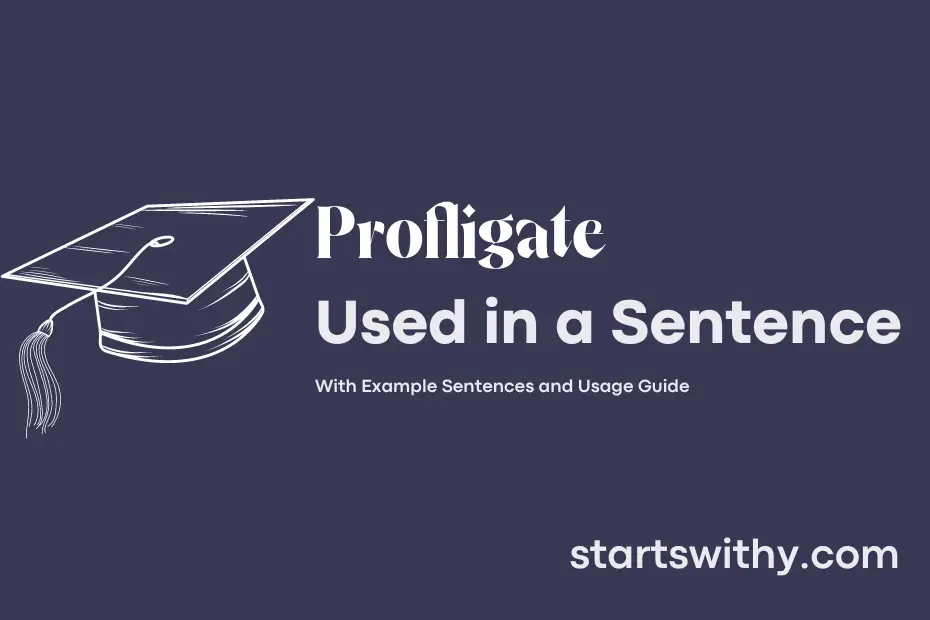Are you familiar with the word “profligate”? This descriptive term is often used to characterize someone who is recklessly extravagant and wasteful in their spending or actions, often to a point of excess.
Individuals labeled as profligate often exhibit a lack of restraint or self-control, indulging in behaviors that are considered excessive or irresponsible. We will further explore the nuances and implications of the word “profligate” in various contexts throughout this text.
7 Examples Of Profligate Used In a Sentence For Kids
- Profligate means spending or using something in a careless way.
- Don’t be profligate with your toys, take care of them.
- It’s not good to be profligate with water, we should save it.
- We should not be profligate with food, always eat what you take.
- Always remember not to be profligate with paper, save trees.
- Let’s not be profligate with electricity, turn off lights when not needed.
- It’s important to not be profligate with our time, use it wisely.
14 Sentences with Profligate Examples
- Profligate spending on unnecessary items often leads to financial struggles for college students.
- It is important for students to avoid profligate behavior when it comes to managing their budget.
- Engaging in profligate drinking habits can have a negative impact on a student’s health and academic performance.
- Some students indulge in profligate partying without considering the consequences on their studies.
- It’s crucial for college students to resist the temptation of profligate spending during festive seasons or sales.
- The culture of profligate borrowing among students can lead to insurmountable debt in the future.
- Students should be cautious of living a profligate lifestyle to maintain a healthy balance between academics and social life.
- An awareness campaign about the dangers of profligate behavior could benefit students in making more responsible choices.
- Effective budgeting skills can help students avoid profligate financial habits.
- Peer pressure can sometimes lead students to engage in profligate activities they wouldn’t normally consider.
- It’s important for college students to prioritize their needs over profligate desires while managing their expenses.
- Falling into the trap of profligate spending can hinder a student’s ability to save for important goals, such as further education or travel.
- Avoiding profligate use of resources, such as paper and electricity, can contribute to a more sustainable campus environment.
- Encouraging responsible behavior towards money and resources can help students steer clear of profligate habits.
How To Use Profligate in Sentences?
To use Profligate in a sentence, follow these simple steps:
-
Understand the meaning of Profligate:
- Profligate means recklessly extravagant or wasteful in the use of resources. It usually has a negative connotation of someone who spends money or resources in a carefree and irresponsible manner.
-
Choose the context:
- Think of a situation where someone is spending money or resources excessively without considering the consequences.
-
Form a sentence:
- Use Profligate as an adjective to describe a person or their actions. For example: “The billionaire’s profligate spending habits led to his bankruptcy.”
-
Check the sentence:
- Ensure that the sentence makes sense and accurately conveys the meaning of Profligate in the context you have chosen.
-
Practice using Profligate in different sentences:
- Experiment with different scenarios and contexts to become more comfortable with using Profligate in your speech or writing.
Remember that using Profligate in a sentence can help you expand your vocabulary and communicate more effectively. Practice incorporating it into your daily conversations to improve your language skills and understanding of the word’s meaning.
Conclusion
In conclusion, the examples of sentences with the keyword “profligate” showcase a range of contexts where the term can be applied. From describing extravagant spending habits to reckless behavior, the word “profligate” conveys a sense of wastefulness and excess. By using this word in sentences, one can effectively illustrate behavior that is careless or extravagantly wasteful.
The diverse examples provided highlight the versatility of the word “profligate” and its ability to succinctly convey a specific type of behavior or attitude. Whether describing financial irresponsibility or moral decadence, incorporating “profligate” into sentences adds depth and precision to communication, allowing for a more nuanced expression of extravagant and reckless behaviors.



